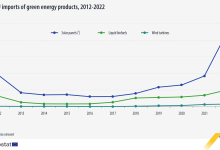RES to Emerge Even Stronger in Spite of Pandemic Impact
Amidst the chaos, uncertainty, and coronavirus-induced investment slowdown, it is imperative that global leaders do not become distracted from economic initiatives that contribute to Europe’s low-carbon economy transition. There is a big opportunity for the renewable energy sector (RES) to emerge even stronger from the current crisis.
The current crisis only emphasizes the challenges we are facing through global warming, the increasing spread of diseases, weather abnormalities, migration of unprecedented scale, and social and business disruptions. Global leaders must resist the sirens calling for protection of and subsidies for outdated polluting and resource-consuming industries.
While governments and financial institutions are declaring multibillion Euro rescue packages to stabilize hard-hit economies, we must ensure these funds are directed towards tackling the most pressing issues. Every Euro spend needs to be scrutinized for its impact towards a more sustainable, resilient, ecological and socially beneficial economy, which avoids mistakes of the past and directs investments to those areas which contribute to the well-being of our society and the future of our civilization.
To this end, recent statements from the President of the European Commission Ursula von der Leyen and major European leaders affirm that the green deal will serve as the ‘motor for the EU’s recovery’. Transparent and efficient policies, which will guide the future development of the renewable energy sector, must underpin the green deal. Effective government governance based on well-designed energy market systems and strategic vision can translate into a big opportunity for the sector to emerge even stronger from the current crisis.
What needs to be done now?
We need to stabilize current business operations. Companies constructing wind and solar facilities are facing major supply chain disruptions as global factories producing turbines, solar panels and mechanical and electrical equipment are yet to return to full capacity. Due to strict lockdown measures, the movement of goods has been impaired. Activities across construction sites have slowed down due to restrictions on the movement of people and health precautions.
On the positive side, renewable plants have experienced very few business disruptions. Decentralized renewable energy facilities have demonstrated their full potential during the crisis, contributing strongly to security of supply and energy independence. Faced with this unprecedented situation, the immediate priority for every RES company was to ensure the wellbeing of their workers and the continuity of their business. Where required, sector support must be provided as a temporary measure to ensure liquidity of RES businesses and to avoid large-scale bankruptcies, which could pose a substantial risk to rapid economic recovery.
On the supply side, having previously predicted a fall in the price of solar panels in 2020 due to oversupply, consultancy Wood Mackenzie is now predicting supply delays late into the second quarter and price increases during the second half of the year. Given a sharp economic contraction, reduced demand for energy is also likely to impact on the availability of investment finance for further energy sector growth.
Companies will need to put in place measures to minimize the negative impact on their businesses until markets and supply chains are stabilized, with the most realistic projections suggesting this will only happen in the third quarter of 2020.
So, with evidence pointing to a slowdown in the world’s clean energy transition, how can we revive the renewable energy sector?
The underlying fact is that major trends in the energy industry have not changed. ESG investments have outperformed an admittedly declining market. MarketWatch recently concluded that ESG related companies on the S&P 500 have collectively outperformed the rest of the index by 33% since the beginning of the crisis. ESG investments, including renewable energy, are now a relative safe haven for investors. They are the new normal.
The current crisis has only confirmed the view of major think tanks and industry observers about the increasing volatility risk of conventional fuels for the energy industry, compared to much more predictable and commercially mature investment in renewables. With renewables now being competitive in most markets, this strengthens its position amongst investors and the long-term prospects of the renewable energy sector. However, the extent to which it recovers momentum will be disproportionately impacted by the various stimulus packages being assembled around the world.
The IEA predicts that low-carbon sources are set to extend their lead this year to reach 40% of global electricity generation – 6% points ahead of coal. While a recently released report by IRENA has shown the enormous benefits that moving now to prop up the renewable sector could have on the post COVID-19 recovery. In its assessment, IRENA claims that a decarbonization path totalling USD 110 trillion would create significant socio-economic gains, generating savings of between USD 50 trillion and USD 142 trillion by 2050.
Working closely with the business community, governments need to recognize that by increasing investment in clean technologies and infrastructure they can help to regenerate growth whilst helping to realize their Paris agreement decarbonization obligations. The international financial institutions also can play a vital role in supporting renewable energy investment. In order to reap the full benefits of renewables, they need to provide the necessary stimulus and policy guidance to enable the market integration of renewables.
Markets will increasingly promote growing B-to-B trade of renewable energy, serving the increasing decarbonization needs of industries, commercial businesses and households. The political will and vision of policy makers can provide a sustainable basis for attracting investments to countries like Ukraine. A country that offers huge long-term potential for the integration and stabilization of European clean energy markets.
Storms make trees take deeper roots, as an old song goes. So, whilst the coronavirus storm will ultimately die down, business, government and the international financial institutions have an opportunity to ensure the renewable energy sector comes out of this crisis with even deeper roots.







